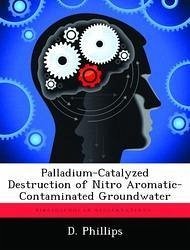Of the over 17,000 DoD sites that potentially require remediation, sites containing soil and groundwater contaminated by energetic compounds are prevalent (Larson et al., 2001). Production of energetics such as 2,4,6-trinitrotoluene (TNT), hexahydro-1,3,5- trinitro-1,3,5-triazine (RDX), and octahydro-1,3,5,7-tetranitro-1,3,5,7-tetrasocine (HMX) for use in munitions has created a DoD-wide problem due to improper disposal techniques (Price et al., 2001). Nitro aromatic compounds (NACs) similar to those used in explosives can also be found in insecticides, herbicides, pharmaceuticals, dyes, plastics, and many other commonly used products. The natural breakdown of these contaminants creates byproducts such as amines, which are known neurotoxins and carcinogens. The focus of this study was to determine the effectiveness of using a palladium (Pd) catalyst to reductively destroy NAC-contaminated groundwater under various conditions and to assess the feasibility of using a catalytic reactor in a horizontal flow treatment well (HFTW) system. Experimental results indicate reaction rates are dependent on both pH and reductant concentration in all experimental catalyst/reductant systems. Catalyst poisoning was seen at high contaminant concentrations in systems where molecular hydrogen was used as a reductant at low concentrations.
Hinweis: Dieser Artikel kann nur an eine deutsche Lieferadresse ausgeliefert werden.
Hinweis: Dieser Artikel kann nur an eine deutsche Lieferadresse ausgeliefert werden.

